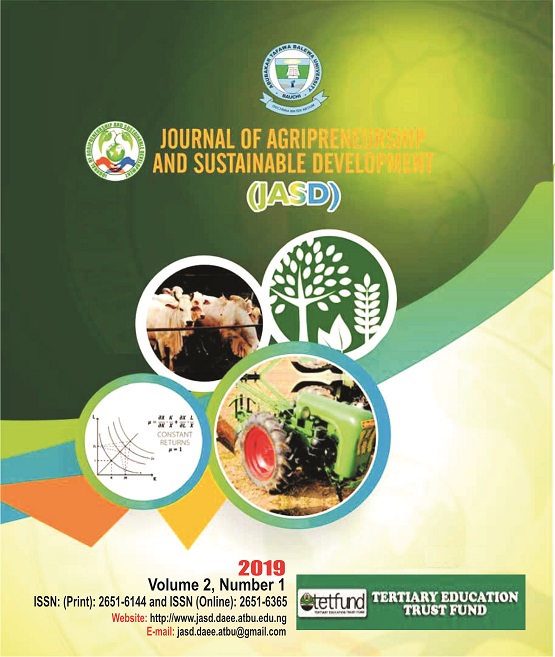COMPARATIVE ANALYSIS OF FOOD SECURITY STATUS OF PARTICIPANTS AND NON-PARTICIPANT FARMERS IN MILLENNIUM VILLAGE PROJECTS IN IKARA LOCAL GOVERNMENT AREA OF KADUNA, NIGERIA
DOI:
https://doi.org/10.59331/jasd.v2i1.71Keywords:
Food, hunger, Project, Respondents, SecurityAbstract
This study was carried out to compare the food security status of participants and Non-participant farmers in millennium village projects in Ikara Local Government Area of Kaduna State, Nigeria. A multi-stage sampling procedure was adopted to determine the sample size of 320 for the study. The statistical tools used to analyze the data were descriptive statistics and the United States cost-of-calorie index. The results revealed aggregate income gap (G) of -61.228, -62.012 and -185.775 for MVPI, MVP II and non-participant, respectively, indicating that food insecure households would need 61.228, 62.012 and 185.775 per adult equivalent to meet their daily basic food requirements for MVPI, MVP II and non-participant, respectively. The results showed that participant farmers of the projects were more food secured (62%) than the non-participant (16%). Also, more participants with food insecurity without hunger (33%) were reported than their counterparts but fewer than their counterparts in terms of insecurity with moderate hunger (20.6%) and food insecurity with severe hunger. The findings further indicates that majority (61%) of the respondents were food secured than the non-participant farmers (16%). The mean food security index for food secured and food insecure households were 1.43 and 0.81, respectively. The food insecurity gap of 0.19 and 0.43 implies that on the average, the food insecure households consumed 19% less than their daily calorie requirements whilst food secured households consumed 43% in excess of their daily calorie requirements. The participants and non-participants were faced with challenges of stringent rules and regulations, and inadequate capital. The study recommended that the respondents should scale up own food production (cereals, legumes and tubers, home gardens, livestock, poultry and fishing) in order to ensure sustainability of food security in the study area.
Downloads

Downloads
Published
How to Cite
Issue
Section
License
Copyright (c) 2022 Journal of Agripreneurship and Sustainable Development

This work is licensed under a Creative Commons Attribution 4.0 International License.






